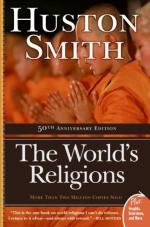
|
| Name: _________________________ | Period: ___________________ |
This test consists of 15 multiple choice questions and 5 short answer questions.
Multiple Choice Questions
1. What does Huston Smith say about the existence of religions prior to the historical ones of the last 4,000 years?
(a) The world had no religious experience prior to 4,000 B. C.
(b) Modern religions were the first instances of religion on earth.
(c) Prior to Hinduism, Buddhism, Confucianism, Christianity, and Islam, people had no concept of religion.
(d) Modern religions were prefigured by the primal, tribal religions.
2. Who was the person from whom Christianity originated?
(a) Jesus, a Jewish tax collector
(b) Jesus, a high priest of the Jews
(c) Jesus, a Jewish carpenter
(d) Jesus, a Jewish fisherman
3. What tenet of Christianity is rejected by both Judaism and Islam?
(a) The idea that Jesus was from God
(b) The idea that there is only one true religion
(c) The idea that God saves man
(d) The idea of the Trinity
4. Why does Huston Smith say attempts to unite Protestantism have failed?
(a) Because of reluctance to let go of certain tenets
(b) Because people gave up too quickly
(c) Because no one tried to do it
(d) Because people like change
5. What is the main thing gleaned from reading the Tao Te Ching?
(a) The idea that Tao is earth, wind, and fire
(b) The idea that it cannot be understood
(c) The idea that the Tao is within us
(d) The idea that Tao is of the universe only
6. At what point did Jesus' followers begin to accept him as God in human form?
(a) Some time after his death
(b) When there was a massive earthquake
(c) When he healed a blind man
(d) The first time they heard him speak
7. What does Huston Smith say is the daunting task as the world grows smaller?
(a) Selecting one religion for all
(b) Finding a place to live
(c) Building better weaponry
(d) Improving human relations
8. How do Jewish concepts appear compared with Hinduism?
(a) In some agreement
(b) Incomparable
(c) Identical
(d) In opposition
9. What was the main cause of the rise of Protestantism?
(a) Different interpretation of scripture
(b) Language barriers
(c) Eccliastical excesses in the Roman church
(d) Acceptance of Eastern orthodoxy
10. As a chosen people, what were the Jews to do?
(a) Sing and pray
(b) Write and read
(c) Teach and compel
(d) Serve and suffer
11. With what were the minor, or writing prophets, concerned?
(a) Keeping an accurate history of the kings
(b) Perserving the power of the priests
(c) Social inequities and moral delinquency
(d) Councils for revising Jewish law
12. What teaching of Protestantism differs from Catholic doctrine?
(a) The importance of baptism
(b) The importance of church attendance
(c) The need for spiritual guidance
(d) Justification by faith
13. How do Jewish people view their traditions?
(a) As the memories of the past which are treasured possessions
(b) As unimportant except for the fun they bring
(c) As meaningless ritual
(d) As handles on the real world around them
14. Why does Huston Smith not discuss a comparison of religions as to superiority?
(a) He says there is no way to do it.
(b) He says there is nothing to be gained by doing so.
(c) He says it would be too objective.
(d) He says that would take volumes instead of a single book.
15. What are the three areas of mysticism in Sufism?
(a) Prophecy, interpretation, seances
(b) Communication with the dead, using hallucinogens, speaking in tongues
(c) Faith, hope, charity
(d) Love, ecstasy, intuition
Short Answer Questions
1. How do Muslims justify Islam's history of aggressiveness?
2. How is the length of Jesus' ministry best described?
3. What saves the Christian in spite of his imperfect nature?
4. How is al-qur'an divided?
5. Where did Muhammad make his most converts early on?
|
This section contains 667 words (approx. 3 pages at 300 words per page) |

|




